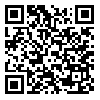BibTeX | RIS | EndNote | Medlars | ProCite | Reference Manager | RefWorks
Send citation to:
URL: http://etiadpajohi.ir/article-1-676-en.html
Objective: The present study was conducted with the aim of examining the effectiveness of well-being-therapy in mental health, psychopathology, and happiness in male substance-dependent addicts (Methamphetamine). Method: For this purpose, a quasi-experimental research design along with pre-test, post-test and control group was used for the conduct of the present study. The research sample consisted of six men with similar educational background, age, social class, duration and dose of methamphetamine use who were randomly assigned to experimental and control groups. Then, the treatment was individually conducted on each member of the experimental group. Each of the participants of the experimental group received twelve weekly 50-minute sessions of well-being-therapy. Then, they were evaluated in pre-test and post-test using Mental Health Continuum-Long Form (MHC-LF), Lambert Outcome Questionnaire, and Oxford Happiness Questionnaire. Results: The results showed that well-being-therapy has had a significant effect on the improvement of mental health, psychopathology, and happiness. Conclusion: The results of the present study can be beneficial in the evaluation, treatment planning interventions, and directions for future studies among methamphetamine consumers.
Received: 2015/01/7 | Accepted: 2016/09/30 | Published: 2016/11/5
| Rights and permissions | |
 |
This work is licensed under a Creative Commons Attribution-NonCommercial 4.0 International License. |





